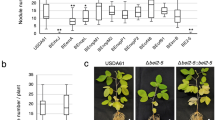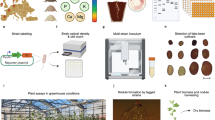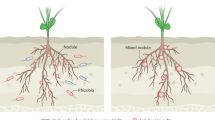Abstract
Despite the importance of mutualism as a key ecological process, its persistence in nature is difficult to explain since the existence of exploitative, 'cheating' partners that could erode the interaction is common. By analogy with the proposed policing strategy stabilizing intraspecific cooperation, host sanctions against non N2 fixing, cheating symbionts have been proposed as a force stabilizing mutualism in legume-Rhizobium symbiosis. Following this proposal, penalizations would include decreased nodular rhizobial viability and/or early nodule senescence in nodules occupied by cheating rhizobia. In this work, we analyze the stability of Rhizobium-legume symbiosis when "cheating" strains are present, using an experimental and modelling approach. We used split-root experiments with soybean plants inoculated with two rhizobial strains, a cooperative, normal N2 fixing strain and an isogenic non-fixing, “perfect” cheating mutant derivative that lacks nitrogenase activity but has the same nodulation abilities inoculated to split-root plants. We found no experimental evidence of functioning plant host sanctions to cheater rhizobia based on nodular rhizobia viability and nodule senescence and maturity molecular markers. Based on these experiments, we developed a population dynamic model with and without the inclusion of plant host sanctions. We show that plant populations persist in spite of the presence of cheating rhizobia without the need of incorporating any sanction against the cheater populations in the model, under the realistic assumption that plants can at least get some amount of fixed N2 from the effectively mutualistic rhizobia occupying some nodules. Inclusion of plant sanctions merely reduces the time needed for reaching plant population equilibrium and leads to the unrealistic effect of ultimate extinction of cheater strains in soil. Our simulation results are in agreement with increasing experimental evidence and theoretical work showing that mutualisms can persist or even improve in presence of cheating partners.
Similar content being viewed by others
Article PDF
Author information
Authors and Affiliations
Corresponding author
Rights and permissions
About this article
Cite this article
Marco, D., Carbajal, J., Cannas, S. et al. An experimental and modelling exploration of the host-sanction hypothesis in legume-rhizobia mutualism. Nat Prec (2008). https://doi.org/10.1038/npre.2008.1964.1
Received:
Accepted:
Published:
DOI: https://doi.org/10.1038/npre.2008.1964.1



